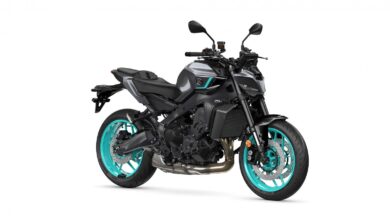Sport bikes: The hardest hit part of the U.S. industry?-October 5, 2009
By Neil Pascale
Editor
Tony Hayter, general manager of Grand Prix Motorsports in Littleton, Colo., is not alone when he recalls a common chore that all but disppeared this summer. You know, that time spent trying to chase down the hot new sport bike model that the store just can’t keep in stock.
“For the first year in I don’t know how long, it’s been really, really difficult to identify the hot products” in the sport bike market, Hayter said.
In fact, industry experts identify the sport bike market as one of the biggest victims of the recession, and more to the point, the tighter lending restrictions that started in late 2008.
“I think one of the things that caught the industry this year is how vulnerable the sport bike market is to the availability of consumer credit,” Ducati North America CEO Michael Lock said. “No consumer credit means no sport bikes.”
That outlook is backed by state registration data provided by R.L. Polk. From November 2007 through April 2008, sport bikes from Suzuki, Yamaha and Honda made up three of the top five selling on-highway models in the United States. Fast forward a year and only one sport bike — the Kawasaki Ninja 250 — was among the top seven selling models in the United States from January through May.
“The surprise for a lot of people in the industry is that sport bikes have declined more sharply than cruisers,” Lock said.
How sharply are sport bike retail sales off compared to a year ago? Powersports Business does not have access to an official number from the Motorcycle Industry Council (MIC), but industry sources put the decline at 50-60 percent for the largest sector of the market, bikes with more than 500cc.
However, there are distinct differences by region of the country.
Hayter, the Colorado general manager, said the 600cc segment “has been better than the lead bikes for sure this year. The big cc stuff is just stagnant.”
In fact, the dealership that in the past has done well on superbike sales has “seen a severe drop in 600cc trade-ins, which is traditionally where those (superbike) buyers come from. The 600cc and 750cc trade-in leads into the leader bike purchase. We have seen very few 600cc sport bike trade-ins.”
Lending issues
John Resciniti of Motorcycle Mall in Belleville, N.J., has actually seen an uptick in super bike sales this year but overall is down by a double-digit percentage in sport bike sales. The reason? Credit availability.
“The credit wasn’t out there for them,” Resciniti, the vice president of the dealership, said of his sport bike clientele.
Motorcycle Mall, one of the largest GSX-R volume sellers in the nation, has seen its super bike sales increase by 5-7 percent over a year ago, with recent OEM incentive programs fueling that.
That hasn’t been the case at another metric dealership, Coleman PowerSports in Woodbridge, Va. Sales Manager James Wells says sport bike sales, which make up about 40 percent of the store’s bike sales, have been sluggish this year, in particular the bigger displacement bikes.
Wells’ consumers are now looking first at used bikes before even considering the new ones.
“People still want the thrill,” he said of sport bike consumers. “They just want to spend $6,000-$7,000 on a used 1000cc rather than $12,000-$13,000 on new.”
Those that are buying new at Coleman PowerSports are increasingly eyeing “hybrid” sport bikes, like the Suzuki Gladius or the Kawasaki ZZR. “Women are buying them. Men are buying them,” Wells said. “Your 25-and-up crowd is buying them. Even the old guys that have had 1000ccs before. They’re buying the in-between bikes to be cheap on gas.”
‘No consistency’
Other dealers also see interest in the “hybrid” or standard bikes, but certainly not enough in volume to take up the downfall experienced in the largest sport bike categories. Downfalls that are distinctly different depending on the part of the country they’re selling in.
“There’s no consistency to this downturn,” Lock of Ducati said. “There’s no easy reading of the signs.”
Besides, of course, the impact on the sport bike demographic, notes Mark Kennedy, CEO of Triumph’s North American subsidiary. “In terms of the economy, I think the demographic of the customer for the super sport bikes specifically has been hit very hard in terms of jobs and being able to get financed,” he said.
However, there have been some signs of a recovery in the sector as Lock notes early reports on September have been positive.




